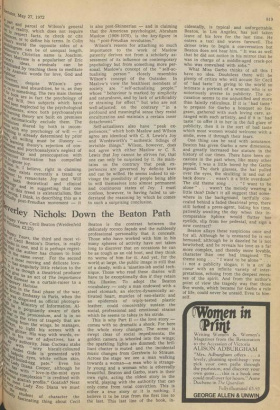ley Nichols: Down the Beaton Path
?ears Cecil Beaton (Weidenfeld 41e uoson e2.25)
ofYears, the third and most viOopit:lcil Beaton's Diaries, is really kittle that' 122 one, and it is perhaps regret th author has chosen to bind a eLne same cover. For the second rrMat moving and delicate lovelittle relation to the „ te ;as though a theatrical producer 4411egltve Qs an act of The Importance Qrnest as a curtain-raiser to a e on rarY He/oise the final phase of the war, r wassu Embassy in Paris, when the for th disguised as official photogra tigh Ministry of Information. AI‘vs 's Poignantly aware of dark le on the proscenium, and is in no I at to ethoi the cries of tragedy that are tilLilvaystig from the wings, he manages, 'earl ' to light his scenes with a itiglitter. His way with words, es . spilt h's use of adjectives, has a 4it aUthority. Jean Cocteau stabs AT,Wriith " wiry biscuit-coloured tacC:rc Gide is presented with „'la"°!e eyes, white vellum skin, ‘b`tf iSadthied-egg pate." Even his her jana Cooper, although he ipi kali, With " love-in-the-mist eyes °111:111:e COMPlexion " is credited with N goatish profile." Goatish? Next e osely, Lady Zoo Diana we must 4 th Nally student of character the fascinating thing about Cecil Beaton is the contrast between the delicately rococo facade and the ruthlessly professional personality that it conceals. Those who have worked with him in his many spheres of activity have not taken long to discover that on occasions he can be as tough as an old boot, and they think no worse of him for it. And yet, for the world at large, the public image is still that of a dandy, with a 'nineties-ish social technique. Those who read these diaries will have to be exceptionally dim if they retain this illusion. To adopt the Beaton vocabulary — only a man endowed with a steel stomach, an electro-dynamically activated heart, muscles of neo-elastic and an epidermis of triply-tested plastic leather, could conceivably sustain the social, professional and emotional strains which he seems to takes in his stride.
This is why Part II — the love story — comes with so dramatic a shock. For here the whole story changes. The scene is swept clear of social impedimenta; the golden camera is wheeled into the wings; the sparkling lights are dimmed; the brilliant chatter is muted and the incidental music changes from Gershwin to Strauss. Across the stage we see a man walking towards a woman—a man who is strangely young and a woman who is ethereally beautiful. Beaton and Garbo, stars in their own right, acting the oldest story in the world, playing with the authority that can only come from total conviction. This is either a true story or it is nothing. I believe it to be true from the first line to the last. This last line of the book, in cidentally, is typical and unforgettable. Beaton, in Los Angeles, has just taken leave of his love for the last time. He enters a taxi and waves farewell. The driver tries to begin a conversation but Beaton does not hear him. "It was as well that he did not notice in his mirror that he was in charge of a middle-aged crack-pot who was convulsed with sobs."
What Miss Garbo thinks of all this I have no idea. Doubtless there will be plenty of critics who will accuse Sir Cecil of 'bad taste' in giving to the world so intimate a portrait of a woman who is so notoriously averse to publicity. The accusation seems to me unjustified and more than faintly ridiculous. If it is ' bad taste ' to prepare for Garbo a bouquet so fragrant, gathered with such loving care, arranged with such artistry, and if it is bad taste 'to offer it to her in the full glare of publicity, then it is the sort of bad taste which most women would welcome with a smile, even if through their tears.
One thing can be said with assurance. Beaton has given Garbo a new dimension, and greatly increased her stature in the history of our times. There have been occasions in the past when, like many other people, I was a little bored by the Garbo legend. The dark glasses, the hat pulled over the eyes, the skulking in and out of back doors . . . wasn't it a little overdone? The old theme song . . . "I want to be alone" . . . wasn't the melody wearing a little thin? Didn't it all suggest that somewhere in the background, tactfully concealed behind a faded theatrical prop, there still lurked a press-agent, biding his time, patiently awaiting the day when this incomparable Sphinx would flutter her eyelids, slip from her pedestal, and sign a new contract?
Beaton allays these suspicions once and for all. Although he is ensnared he is not bemused; although he is dazzled he is not bewitched; and he reveals his love as a far more complex, and thereby more lovable, character than one had imagined. The theme song . . . "I want to be alone" . . . i ; not a publicity slogan; it is a cri de coeur with an infinite variety of interpretations, echoing from the deepest recesses of the spirit. And from the author's point of view the tragedy was that those five words, which became for Garbo a rule of life, could never be unsaid. Even to himself.










































 Previous page
Previous page